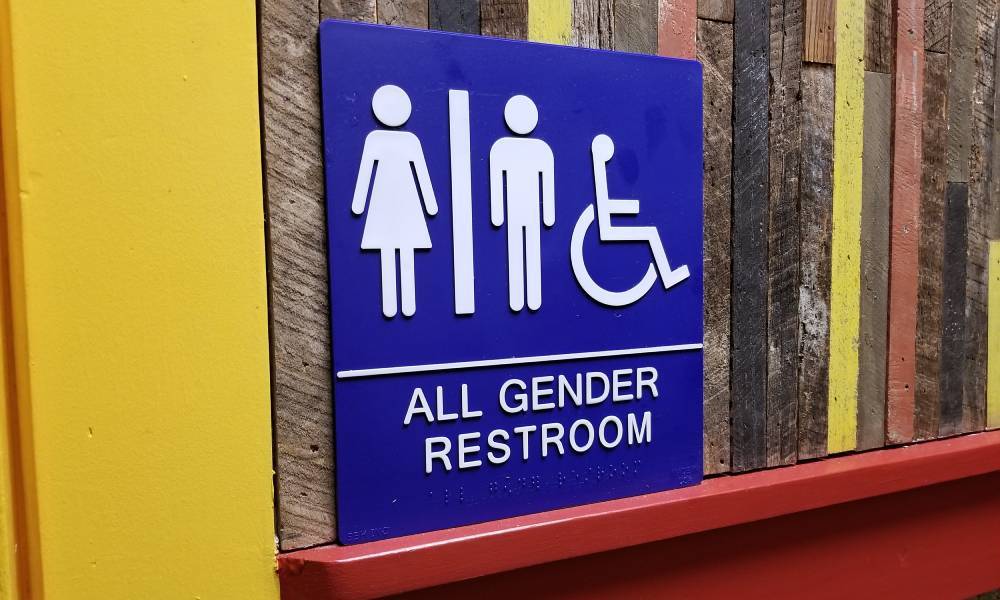Judge Blocks Tennessee's Transgender Bathroom Sign Law
A federal judge on Friday blocked a Tennessee law that required businesses to post a notice if they allow transgender people to use bathrooms that match their gender identity.
Two weeks ago, the American Civil Liberties Union filed a lawsuit on behalf of two business owners — who own Sanctuary, a performing arts and community centre in Chattanooga, and Fido, a restaurant in Nashville, among other businesses — in an effort to block the law from taking effect July 1.
Judge Aleta A. Trauger of the U.S. District Court for the Middle District of Tennessee granted a preliminary injunction against the law while litigation proceeds.
“Restaurants and performing spaces are businesses, but that is not all they are; they are also among the most important physical locations in which communities—so often consigned, in this era, to electronic space—can gather and grow together in a manner rooted in a particular neighborhood, in a particular city, in a particular state,” Trauger wrote.
“The plaintiffs have presented evidence that they have strived to be welcoming spaces for communities that include transgender individuals and that the signage required by the Act would disrupt the welcoming environments that they wish to provide,” Trauger continued.
“That harm would be real, and it is not a harm that could simply be remedied by some award at the end of litigation.”

Glenn Funk and Neal Pinkston, both district attorneys general, and Christopher Bainbridge, director of code enforcement, are named as defendants in the lawsuit and have not returned a request for comment. The communications director for the fourth defendant, Carter Lawrence, the state's fire marshal, declined comment due to ongoing litigation.
Hedy Weinberg, the executive director of the ACLU of Tennessee, said the law is bad for businesses in Tennessee and harmful to trans people.
“We are glad the court saw that this law is likely unconstitutional and hope that the state gives up the wasteful effort to defend discrimination and a violation of the First Amendment,” Weinberg said in a statement.
Kye Sayers, owner of Sanctuary Performing Arts, said in the ACLU statement that she is glad the court “saw that forcing businesses to display a sign that hurts transgender and intersex people is unconstitutional.”
“These signs would have damaged our businesses and the environment we have tried to create for our community, customers, and staff,” she added.
Bob Bernstein, another plaintiff in the lawsuit and the owner of Fido and several local coffee shops, said in the statement the issue is one of free speech for him as a business owner, and he's hopeful the judge's injunction “leads to a permanent ban of an unconstitutional violation of my freedom of speech rights.”
The suit is one of two filed against the law. The other was filed last week by Mike Curb, a Nashville record label owner, who is represented by GLBTQ Legal Advocates and Defenders.
According to ‘NBC News’ the new law requires business owners with even an informal policy that allows people to use whichever bathroom they want to post a sign that reads, “This facility maintains a policy of allowing the use of restrooms by either biological sex regardless of the designation on the restroom,” at the entrance of single-sex public restrooms, locker rooms, dressing areas or other facilities that are “designated for a specific biological sex ... where a person would have a reasonable expectation of privacy.”
The bill's sponsor, Rep. Tim Rudd, R-Murfreesboro, said during legislative debate in May that it is meant to protect women and children “against sexual predators that could be taking advantage of policies, executive orders or legislation that may allow the opposite sex to enter a restroom, shower or locker room,” the Chattanooga Times Free Press reported.
Advocates have said the law is just a new iteration of laws passed in 2016 that sought to bar trans people from using the bathrooms that aligned with their gender identity, such as House Bill 2 in North Carolina.
At that time, proponents of what are known as “bathroom bills” used Rudd's argument about predators, but a 2018 study from the Williams Institute at UCLA School of Law found there is no evidence that trans-inclusive policies for public facilities increase safety risks.
Read related myGwork articles here:
This Campaign Wants To Help Businesses Make Their Bathrooms Safer For Trans People
A Trans Student Was Banned From His Team’s Locker Room. Now The School District Has To Pay $300k.
UK Government Gender-Neutral Toilet Review is Boggling
Pool in Sydney Under Fire for Trans Policy
Keep up to date with the latest myGnews
Sign up to mygwork
________
LGBT professionals, LGBT Graduates, LGBT professional network, LGBT professional events, LGBT networking events, LGBT Recruitment, LGBT Friendly organisations, LGBT Friendly companies, LGBT jobs

